小学四年级陈述句变一般疑问句(包含练习及答案)
小学四年级陈述句变一般疑问句(包含练习进步及规范标准答案)

一般疑问句一、什么是一般疑问句用Yes或No作答的疑问句叫一般疑问句。
一般疑问句还有下列特点:1、以be动词、助动词或情态动词开头;例:Is your father a teacher?Does Catherine like animals?Can Jenny speak French?2、往往读升调;3、译成汉语,都可以带上“吗”,例如上面三句可分别译为:你父亲是老师吗?凯瑟琳喜欢动物吗?詹妮会说法语吗?二、例何将陈述句变成一般疑问句?要将陈述句变成一般疑问句,可以遵循下列步骤:1.看句中有没有be动词(am、is、are)、助动词do、does)情态动词(can、may等),如果有,将其提到句首,句末打上问号即可。
例:It is rainy today.→Is it rainy today?Tom's father can play the piano.→Can Tom's father play the piano?2.如果句中没有be动词、助动词或情态动词,则根据谓语动词的形式借助do的相应形式放在句首。
具体方法是:如果谓语动词是原形,则借do;如果谓语动词是一般现在时第三人称单数形式,则借does.记得助动词和情态动词后面接动词原形。
例:They go to school by bike.→Do they go to school by bike?Bill gets up at 6:30 every day.→Does bill get up at 6:30 every day?三.陈述句变一般疑问句应注意的事项陈述句变成一般疑问句除了遵循上述规则以外,还应注意下列几点:1.如果陈述句中有第一人称,则变问句时最好要变为第二人称。
例:I usually have lunch at school.→Do you usually have lunch at school?My father is playing soccer.→Is your father playing soccer?2.如果陈述句中有some, 则变问句时往往要变成any 。
小学四年级陈述句变一般疑问句(包含练习及答案)资料讲解
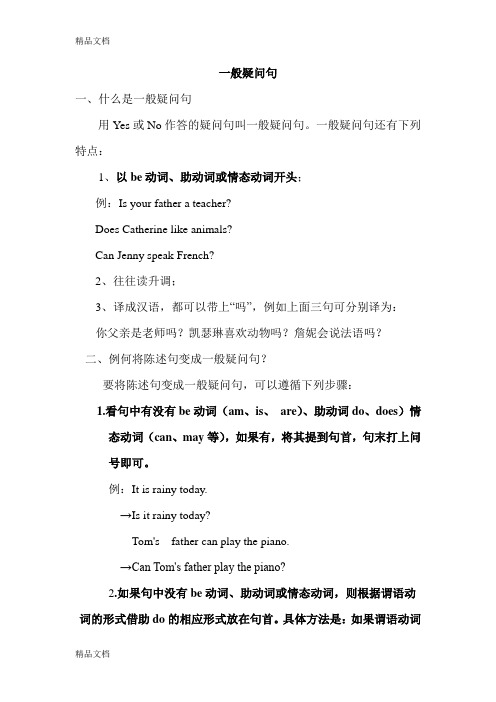
一般疑问句一、什么是一般疑问句用Yes或No作答的疑问句叫一般疑问句。
一般疑问句还有下列特点:1、以be动词、助动词或情态动词开头;例:Is your father a teacher?Does Catherine like animals?Can Jenny speak French?2、往往读升调;3、译成汉语,都可以带上“吗”,例如上面三句可分别译为:你父亲是老师吗?凯瑟琳喜欢动物吗?詹妮会说法语吗?二、例何将陈述句变成一般疑问句?要将陈述句变成一般疑问句,可以遵循下列步骤:1.看句中有没有be动词(am、is、are)、助动词do、does)情态动词(can、may等),如果有,将其提到句首,句末打上问号即可。
例:It is rainy today.→Is it rainy today?Tom's father can play the piano.→Can Tom's father play the piano?2.如果句中没有be动词、助动词或情态动词,则根据谓语动词的形式借助do的相应形式放在句首。
具体方法是:如果谓语动词是原形,则借do;如果谓语动词是一般现在时第三人称单数形式,则借does.记得助动词和情态动词后面接动词原形。
例:They go to school by bike.→Do they go to school by bike?Bill gets up at 6:30 every day.→Does bill get up at 6:30 every day?三.陈述句变一般疑问句应注意的事项陈述句变成一般疑问句除了遵循上述规则以外,还应注意下列几点:1.如果陈述句中有第一人称,则变问句时最好要变为第二人称。
例:I usually have lunch at school.→Do you usually have lunch at school?My father is playing soccer.→Is your father playing soccer?2.如果陈述句中有some, 则变问句时往往要变成any 。
小学四年级陈述句变一般疑问句(包含练习及答案)教学提纲
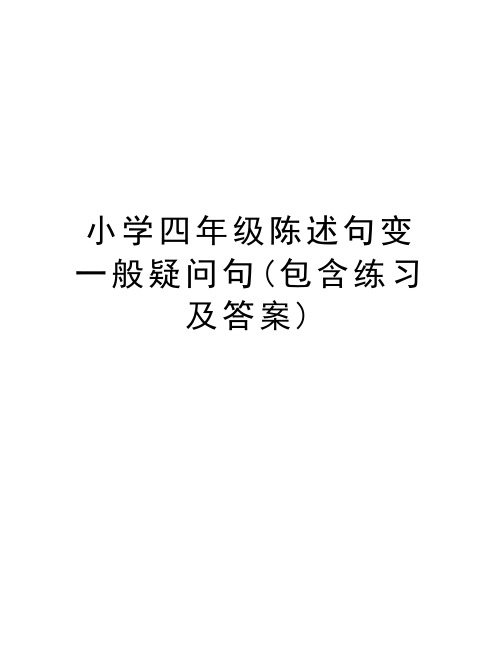
小学四年级陈述句变一般疑问句(包含练习及答案)一般疑问句一、什么是一般疑问句用Yes或No作答的疑问句叫一般疑问句。
一般疑问句还有下列特点:1、以be动词、助动词或情态动词开头;例:Is your father a teacher?Does Catherine like animals?Can Jenny speak French?2、往往读升调;3、译成汉语,都可以带上“吗”,例如上面三句可分别译为:你父亲是老师吗?凯瑟琳喜欢动物吗?詹妮会说法语吗?二、例何将陈述句变成一般疑问句?要将陈述句变成一般疑问句,可以遵循下列步骤:1.看句中有没有be动词(am、is、 are)、助动词do、does)情态动词(can、may等),如果有,将其提到句首,句末打上问号即可。
例:It is rainy today.→Is it rainy today?Tom's father can play the piano.→Can Tom's father play the piano?2.如果句中没有be动词、助动词或情态动词,则根据谓语动词的形式借助do的相应形式放在句首。
具体方法是:如果谓语动词是原形,则借do;如果谓语动词是一般现在时第三人称单数形式,则借does.记得助动词和情态动词后面接动词原形。
例:They go to school by bike.→Do they go to school by bike?Bill gets up at 6:30 every day.→Does bill get up at 6:30 every day?三.陈述句变一般疑问句应注意的事项陈述句变成一般疑问句除了遵循上述规则以外,还应注意下列几点:1.如果陈述句中有第一人称,则变问句时最好要变为第二人称。
例:I usually have lunch at school.→Do you usually have lunch at school?My father is playing soccer.→Is your father playing soccer?2.如果陈述句中有some, 则变问句时往往要变成any 。
小学四年级陈述句变一般疑问句(包含练习及答案)
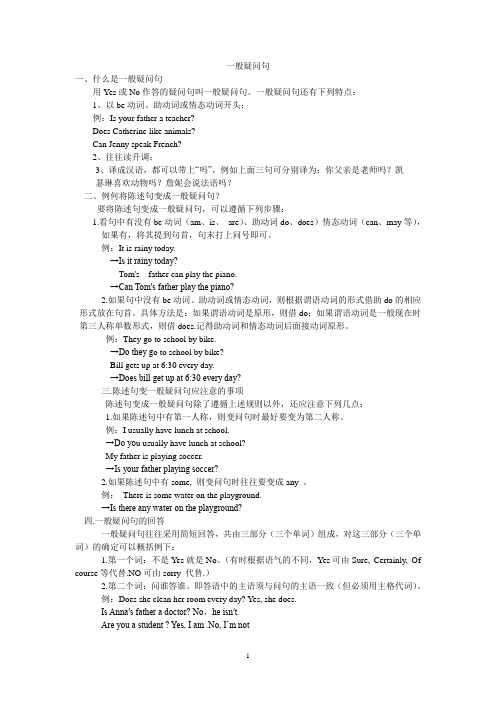
一般疑问句一、什么是一般疑问句用Yes或No作答的疑问句叫一般疑问句。
一般疑问句还有下列特点:1、以be动词、助动词或情态动词开头;例:Is your father a teacher?Does Catherine like animals?Can Jenny speak French?2、往往读升调;3、译成汉语,都可以带上“吗”,例如上面三句可分别译为:你父亲是老师吗?凯瑟琳喜欢动物吗?詹妮会说法语吗?二、例何将陈述句变成一般疑问句?要将陈述句变成一般疑问句,可以遵循下列步骤:1.看句中有没有be动词(am、is、are)、助动词do、does)情态动词(can、may等),如果有,将其提到句首,句末打上问号即可。
例:It is rainy today.→Is it rainy today?Tom's father can play the piano.→Can Tom's father play the piano?2.如果句中没有be动词、助动词或情态动词,则根据谓语动词的形式借助do的相应形式放在句首。
具体方法是:如果谓语动词是原形,则借do;如果谓语动词是一般现在时第三人称单数形式,则借does.记得助动词和情态动词后面接动词原形。
例:They go to school by bike.→Do they g o to school by bike?Bill gets up at 6:30 every day.→Does bill get up at 6:30 every day?三.陈述句变一般疑问句应注意的事项陈述句变成一般疑问句除了遵循上述规则以外,还应注意下列几点:1.如果陈述句中有第一人称,则变问句时最好要变为第二人称。
例:I usually have lunch at school.→Do yo u usually have lunch at school?My father is playing soccer.→Is your father playing soccer?2.如果陈述句中有some, 则变问句时往往要变成any 。
最新小学四年级陈述句变一般疑问句(包含练习及答案)
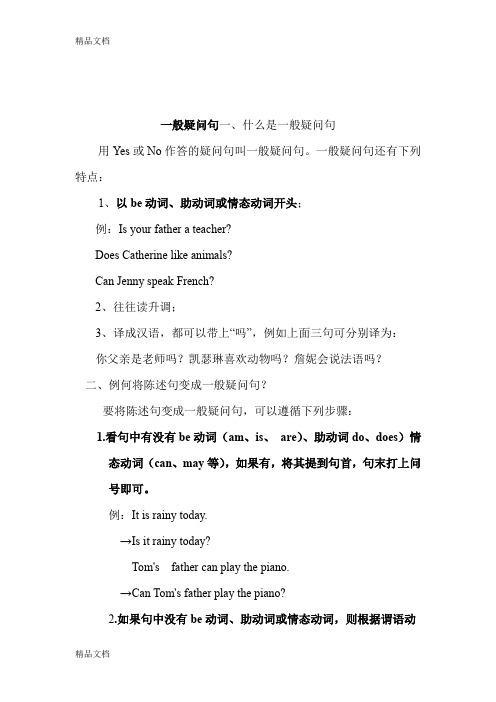
一般疑问句一、什么是一般疑问句用Yes或No作答的疑问句叫一般疑问句。
一般疑问句还有下列特点:1、以be动词、助动词或情态动词开头;例:Is your father a teacher?Does Catherine like animals?Can Jenny speak French?2、往往读升调;3、译成汉语,都可以带上“吗”,例如上面三句可分别译为:你父亲是老师吗?凯瑟琳喜欢动物吗?詹妮会说法语吗?二、例何将陈述句变成一般疑问句?要将陈述句变成一般疑问句,可以遵循下列步骤:1.看句中有没有be动词(am、is、are)、助动词do、does)情态动词(can、may等),如果有,将其提到句首,句末打上问号即可。
例:It is rainy today.→Is it rainy today?Tom's father can play the piano.→Can Tom's father play the piano?2.如果句中没有be动词、助动词或情态动词,则根据谓语动词的形式借助do的相应形式放在句首。
具体方法是:如果谓语动词是原形,则借do;如果谓语动词是一般现在时第三人称单数形式,则借does.记得助动词和情态动词后面接动词原形。
例:They go to school by bike.→Do they go to school by bike?Bill gets up at 6:30 every day.→Does bill get up at 6:30 every day?三.陈述句变一般疑问句应注意的事项陈述句变成一般疑问句除了遵循上述规则以外,还应注意下列几点:1.如果陈述句中有第一人称,则变问句时最好要变为第二人称。
例:I usually have lunch at school.→Do you usually have lunch at school?My father is playing soccer.→Is your father playing soccer?2.如果陈述句中有some, 则变问句时往往要变成any 。
四年级陈述句变一般疑问句包含练习及
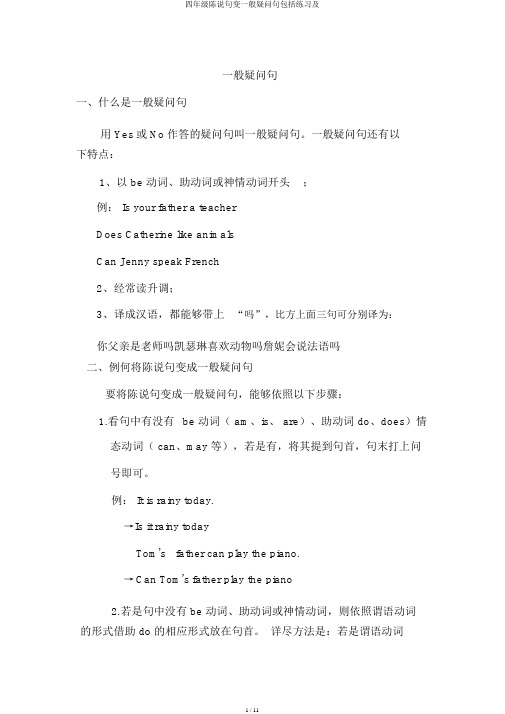
一般疑问句一、什么是一般疑问句用 Yes或 No 作答的疑问句叫一般疑问句。
一般疑问句还有以下特点:1、以 be 动词、助动词或神情动词开头;例: Is your father a teacherDoes Catherine like animalsCan Jenny speak French2、经常读升调;3、译成汉语,都能够带上“吗”,比方上面三句可分别译为:你父亲是老师吗凯瑟琳喜欢动物吗詹妮会说法语吗二、例何将陈说句变成一般疑问句要将陈说句变成一般疑问句,能够依照以下步骤:1.看句中有没有be 动词( am、is、 are)、助动词 do、does)情态动词( can、may 等),若是有,将其提到句首,句末打上问号即可。
例: It is rainy today.→Is it rainy todayTom's father can play the piano.→Can Tom's father play the piano2.若是句中没有 be 动词、助动词或神情动词,则依照谓语动词的形式借助 do 的相应形式放在句首。
详尽方法是:若是谓语动词是原形,则借 do;若是谓语动词是一般现在时第三人称单数形式,则借 does.记得助动词和神情动词后边接动词原形。
例: They go to school by bike.→Do they go to school by bikeBill gets up at 6:30 every day.→Does bill getup at 6:30 every day三.陈说句变一般疑问句应注意的事项陈说句变成一般疑问句除了依照上述规则以外,还应注意下列几点:1.若是陈说句中有第一人称,则变问句时最好要变成第二人称。
例: I usually have lunch at school.→Do you usually have lunch at schoolMy father is playing soccer.→Is your father playing soccer2.若是陈说句中有some, 则变问句时经常要变成any 。
四年级英语句型转换练习20题
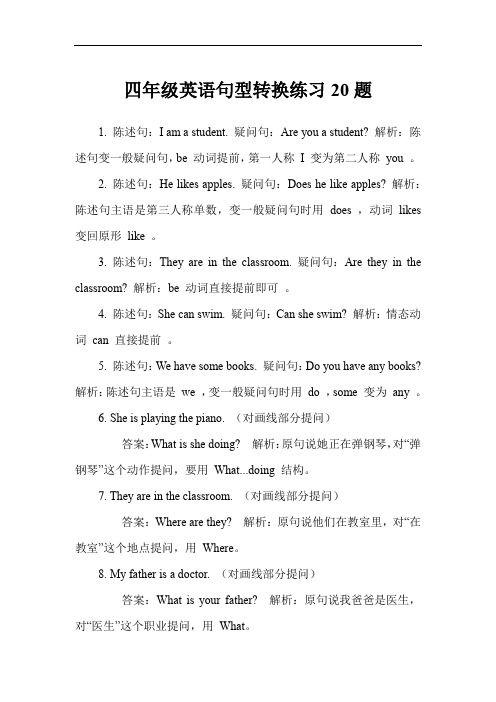
四年级英语句型转换练习20题1. 陈述句:I am a student. 疑问句:Are you a student? 解析:陈述句变一般疑问句,be 动词提前,第一人称I 变为第二人称you 。
2. 陈述句:He likes apples. 疑问句:Does he like apples? 解析:陈述句主语是第三人称单数,变一般疑问句时用does ,动词likes 变回原形like 。
3. 陈述句:They are in the classroom. 疑问句:Are they in the classroom? 解析:be 动词直接提前即可。
4. 陈述句:She can swim. 疑问句:Can she swim? 解析:情态动词can 直接提前。
5. 陈述句:We have some books. 疑问句:Do you have any books? 解析:陈述句主语是we ,变一般疑问句时用do ,some 变为any 。
6. She is playing the piano. (对画线部分提问)答案:What is she doing? 解析:原句说她正在弹钢琴,对“弹钢琴”这个动作提问,要用What...doing 结构。
7. They are in the classroom. (对画线部分提问)答案:Where are they? 解析:原句说他们在教室里,对“在教室”这个地点提问,用Where。
8. My father is a doctor. (对画线部分提问)答案:What is your father? 解析:原句说我爸爸是医生,对“医生”这个职业提问,用What。
9. I have a new book. (对画线部分提问)答案:What do you have? 解析:原句说我有一本新书,对“一本新书”提问,用What...have 结构。
10. He likes apples. (对画线部分提问)答案:What does he like? 解析:原句说他喜欢苹果,对“苹果”提问,用What...like 结构。
(完整版)小学四年级陈述句变一般疑问句(包含练习及答案)
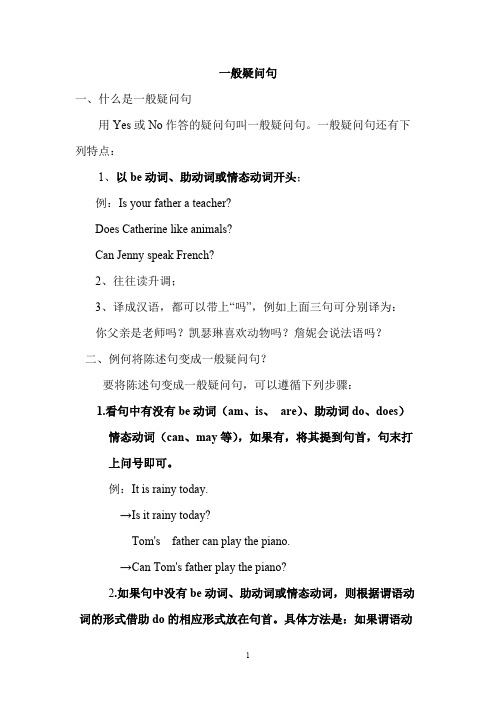
一般疑问句一、什么是一般疑问句用Yes或No作答的疑问句叫一般疑问句。
一般疑问句还有下列特点:1、以be动词、助动词或情态动词开头;例:Is your father a teacher?Does Catherine like animals?Can Jenny speak French?2、往往读升调;3、译成汉语,都可以带上“吗”,例如上面三句可分别译为:你父亲是老师吗?凯瑟琳喜欢动物吗?詹妮会说法语吗?二、例何将陈述句变成一般疑问句?要将陈述句变成一般疑问句,可以遵循下列步骤:1.看句中有没有be动词(am、is、are)、助动词do、does)情态动词(can、may等),如果有,将其提到句首,句末打上问号即可。
例:It is rainy today.→Is it rainy today?Tom's father can play the piano.→Can Tom's father play the piano?2.如果句中没有be动词、助动词或情态动词,则根据谓语动词的形式借助do的相应形式放在句首。
具体方法是:如果谓语动词是原形,则借do;如果谓语动词是一般现在时第三人称单数形式,则借does.记得助动词和情态动词后面接动词原形。
例:They go to school by bike.→Do they go to school by bike?Bill gets up at 6:30 every day.→Does bill get up at 6:30 every day?三.陈述句变一般疑问句应注意的事项陈述句变成一般疑问句除了遵循上述规则以外,还应注意下列几点:1.如果陈述句中有第一人称,则变问句时最好要变为第二人称。
例:I usually have lunch at school.→Do you usually have lunch at school?My father is playing soccer.→Is your father playing soccer?2.如果陈述句中有some, 则变问句时往往要变成any 。
小学四年级陈述句变一般疑问句(包含练习及答案)知识讲解
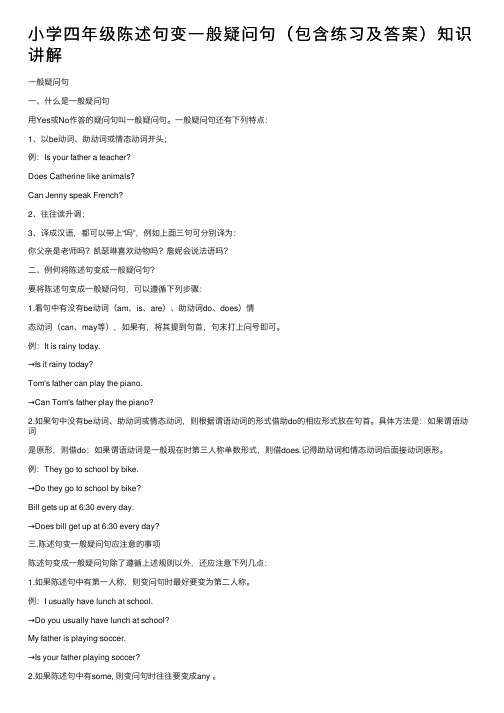
⼩学四年级陈述句变⼀般疑问句(包含练习及答案)知识讲解⼀般疑问句⼀、什么是⼀般疑问句⽤Yes或No作答的疑问句叫⼀般疑问句。
⼀般疑问句还有下列特点:1、以be动词、助动词或情态动词开头;例:Is your father a teacher?Does Catherine like animals?Can Jenny speak French?2、往往读升调;3、译成汉语,都可以带上“吗”,例如上⾯三句可分别译为:你⽗亲是⽼师吗?凯瑟琳喜欢动物吗?詹妮会说法语吗?⼆、例何将陈述句变成⼀般疑问句?要将陈述句变成⼀般疑问句,可以遵循下列步骤:1.看句中有没有be动词(am、is、are)、助动词do、does)情态动词(can、may等),如果有,将其提到句⾸,句末打上问号即可。
例:It is rainy today.→Is it rainy today?Tom's father can play the piano.→Can Tom's father play the piano?2.如果句中没有be动词、助动词或情态动词,则根据谓语动词的形式借助do的相应形式放在句⾸。
具体⽅法是:如果谓语动词是原形,则借do;如果谓语动词是⼀般现在时第三⼈称单数形式,则借does.记得助动词和情态动词后⾯接动词原形。
例:They go to school by bike.→Do they go to school by bike?Bill gets up at 6:30 every day.→Does bill get up at 6:30 every day?三.陈述句变⼀般疑问句应注意的事项陈述句变成⼀般疑问句除了遵循上述规则以外,还应注意下列⼏点:1.如果陈述句中有第⼀⼈称,则变问句时最好要变为第⼆⼈称。
例:I usually have lunch at school.→Do you usually have lunch at school?My father is playing soccer.→Is your father playing soccer?2.如果陈述句中有some, 则变问句时往往要变成any 。
小学四年级陈述句变一般疑问句(包含练习及答案)知识讲解
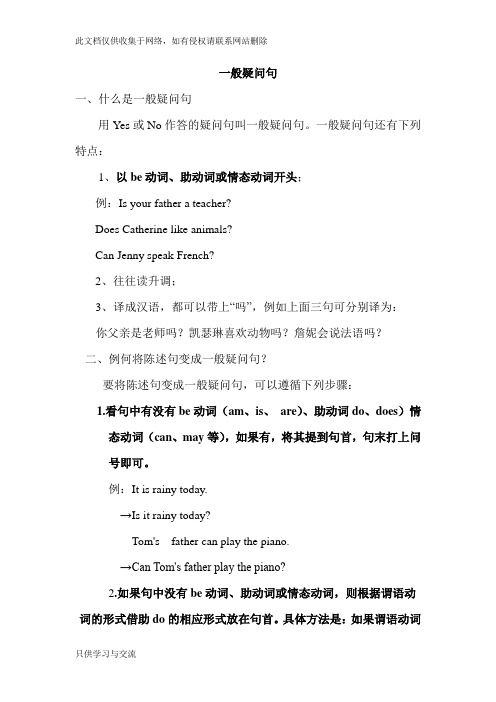
一般疑问句一、什么是一般疑问句用Yes或No作答的疑问句叫一般疑问句。
一般疑问句还有下列特点:1、以be动词、助动词或情态动词开头;例:Is your father a teacher?Does Catherine like animals?Can Jenny speak French?2、往往读升调;3、译成汉语,都可以带上“吗”,例如上面三句可分别译为:你父亲是老师吗?凯瑟琳喜欢动物吗?詹妮会说法语吗?二、例何将陈述句变成一般疑问句?要将陈述句变成一般疑问句,可以遵循下列步骤:1.看句中有没有be动词(am、is、are)、助动词do、does)情态动词(can、may等),如果有,将其提到句首,句末打上问号即可。
例:It is rainy today.→Is it rainy today?Tom's father can play the piano.→Can Tom's father play the piano?2.如果句中没有be动词、助动词或情态动词,则根据谓语动词的形式借助do的相应形式放在句首。
具体方法是:如果谓语动词是原形,则借do;如果谓语动词是一般现在时第三人称单数形式,则借does.记得助动词和情态动词后面接动词原形。
例:They go to school by bike.→Do they go to school by bike?Bill gets up at 6:30 every day.→Does bill get up at 6:30 every day?三.陈述句变一般疑问句应注意的事项陈述句变成一般疑问句除了遵循上述规则以外,还应注意下列几点:1.如果陈述句中有第一人称,则变问句时最好要变为第二人称。
例:I usually have lunch at school.→Do you usually have lunch at school?My father is playing soccer.→Is your father playing soccer?2.如果陈述句中有some, 则变问句时往往要变成any 。
(完整版)小学四年级陈述句变一般疑问句(包含练习及标准答案)

一般疑问句一、什么是一般疑问句用Yes或No作答的疑问句叫一般疑问句。
一般疑问句还有下列特点:1、以be动词、助动词或情态动词开头;例:Is your father a teacher?Does Catherine like animals?Can Jenny speak French?2、往往读升调;3、译成汉语,都可以带上“吗”,例如上面三句可分别译为:你父亲是老师吗?凯瑟琳喜欢动物吗?詹妮会说法语吗?二、例何将陈述句变成一般疑问句?要将陈述句变成一般疑问句,可以遵循下列步骤:1.看句中有没有be动词(am、is、are)、助动词do、does)情态动词(can、may等),如果有,将其提到句首,句末打上问号即可。
例:It is rainy today.→Is it rainy today?Tom's father can play the piano.→Can Tom's father play the piano?2.如果句中没有be动词、助动词或情态动词,则根据谓语动词的形式借助do的相应形式放在句首。
具体方法是:如果谓语动词是原形,则借do;如果谓语动词是一般现在时第三人称单数形式,则借does.记得助动词和情态动词后面接动词原形。
例:They go to school by bike.→Do they go to school by bike?Bill gets up at 6:30 every day.→Does bill get up at 6:30 every day?三.陈述句变一般疑问句应注意的事项陈述句变成一般疑问句除了遵循上述规则以外,还应注意下列几点:1.如果陈述句中有第一人称,则变问句时最好要变为第二人称。
例:I usually have lunch at school.→Do you usually have lunch at school?My father is playing soccer.→Is your father playing soccer?2.如果陈述句中有some, 则变问句时往往要变成any 。
小学四年级陈述句变一般疑问句(包含练习及标准答案)
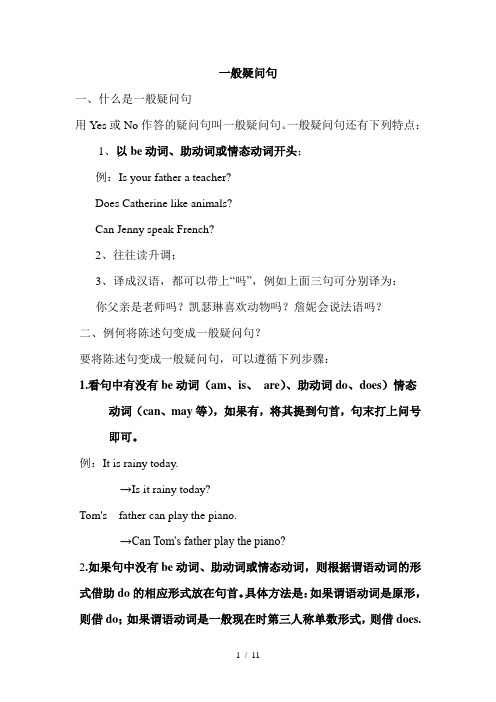
一般疑问句一、什么是一般疑问句用Yes或No作答的疑问句叫一般疑问句。
一般疑问句还有下列特点:1、以be动词、助动词或情态动词开头;例:Is your father a teacher?Does Catherine like animals?Can Jenny speak French?2、往往读升调;3、译成汉语,都可以带上“吗”,例如上面三句可分别译为:你父亲是老师吗?凯瑟琳喜欢动物吗?詹妮会说法语吗?二、例何将陈述句变成一般疑问句?要将陈述句变成一般疑问句,可以遵循下列步骤:1.看句中有没有be动词(am、is、are)、助动词do、does)情态动词(can、may等),如果有,将其提到句首,句末打上问号即可。
例:It is rainy today.→Is it rainy today?Tom's father can play the piano.→Can Tom's father play the piano?2.如果句中没有be动词、助动词或情态动词,则根据谓语动词的形式借助do的相应形式放在句首。
具体方法是:如果谓语动词是原形,则借do;如果谓语动词是一般现在时第三人称单数形式,则借does.记得助动词和情态动词后面接动词原形。
例:They go to school by bike.→Do they go to school by bike?Bill gets up at 6:30 every day.→Does bill get up at 6:30 every day?三.陈述句变一般疑问句应注意的事项陈述句变成一般疑问句除了遵循上述规则以外,还应注意下列几点:1.如果陈述句中有第一人称,则变问句时最好要变为第二人称。
例:I usually have lunch at school.→Do you usually have lunch at school?My father is playing soccer.→Is your father playing soccer?2.如果陈述句中有some, 则变问句时往往要变成any 。
小学四年级陈述句变一般疑问句(包含练习及答案)教学提纲

小学四年级陈述句变一般疑问句(包含练习及答案)一般疑问句一、什么是一般疑问句用Yes或No作答的疑问句叫一般疑问句。
一般疑问句还有下列特点:1、以be动词、助动词或情态动词开头;例:Is your father a teacher?Does Catherine like animals?Can Jenny speak French?2、往往读升调;3、译成汉语,都可以带上“吗”,例如上面三句可分别译为:你父亲是老师吗?凯瑟琳喜欢动物吗?詹妮会说法语吗?二、例何将陈述句变成一般疑问句?要将陈述句变成一般疑问句,可以遵循下列步骤:1.看句中有没有be动词(am、is、 are)、助动词do、does)情态动词(can、may等),如果有,将其提到句首,句末打上问号即可。
例:It is rainy today.→Is it rainy today?Tom's father can play the piano.→Can Tom's father play the piano?2.如果句中没有be动词、助动词或情态动词,则根据谓语动词的形式借助do的相应形式放在句首。
具体方法是:如果谓语动词是原形,则借do;如果谓语动词是一般现在时第三人称单数形式,则借does.记得助动词和情态动词后面接动词原形。
例:They go to school by bike.→Do they go to school by bike?Bill gets up at 6:30 every day.→Does bill get up at 6:30 every day?三.陈述句变一般疑问句应注意的事项陈述句变成一般疑问句除了遵循上述规则以外,还应注意下列几点:1.如果陈述句中有第一人称,则变问句时最好要变为第二人称。
例:I usually have lunch at school.→Do you usually have lunch at school?My father is playing soccer.→Is your father playing soccer?2.如果陈述句中有some, 则变问句时往往要变成any 。
四年级英语句型转换练习30题
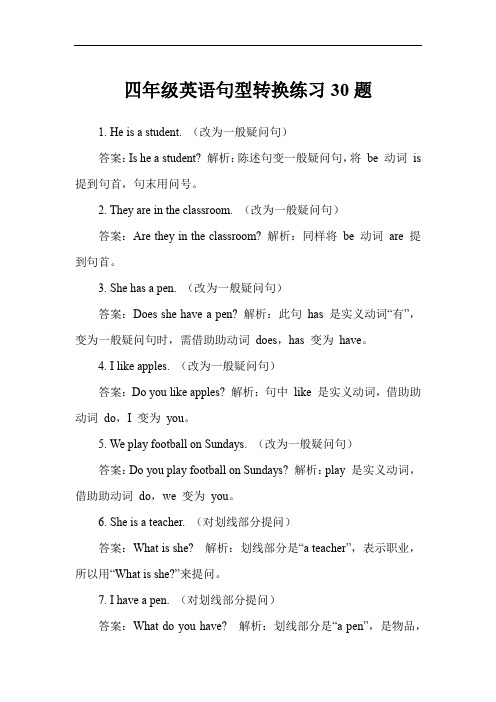
四年级英语句型转换练习30题1. He is a student. (改为一般疑问句)答案:Is he a student? 解析:陈述句变一般疑问句,将be 动词is 提到句首,句末用问号。
2. They are in the classroom. (改为一般疑问句)答案:Are they in the classroom? 解析:同样将be 动词are 提到句首。
3. She has a pen. (改为一般疑问句)答案:Does she have a pen? 解析:此句has 是实义动词“有”,变为一般疑问句时,需借助助动词does,has 变为have。
4. I like apples. (改为一般疑问句)答案:Do you like apples? 解析:句中like 是实义动词,借助助动词do,I 变为you。
5. We play football on Sundays. (改为一般疑问句)答案:Do you play football on Sundays? 解析:play 是实义动词,借助助动词do,we 变为you。
6. She is a teacher. (对划线部分提问)答案:What is she? 解析:划线部分是“a teacher”,表示职业,所以用“What is she?”来提问。
7. I have a pen. (对划线部分提问)答案:What do you have? 解析:划线部分是“a pen”,是物品,用“What do you have?”询问。
8. They are in the classroom. (对划线部分提问)答案:Where are they? 解析:划线部分“in the classroom”是地点,用“Where are they?”提问。
9. He likes apples. (对划线部分提问)答案:What does he like? 解析:划线部分“apples”是物品,用“What does he like?”来问。
小学四年级陈述句变一般疑问句包含练习与答案
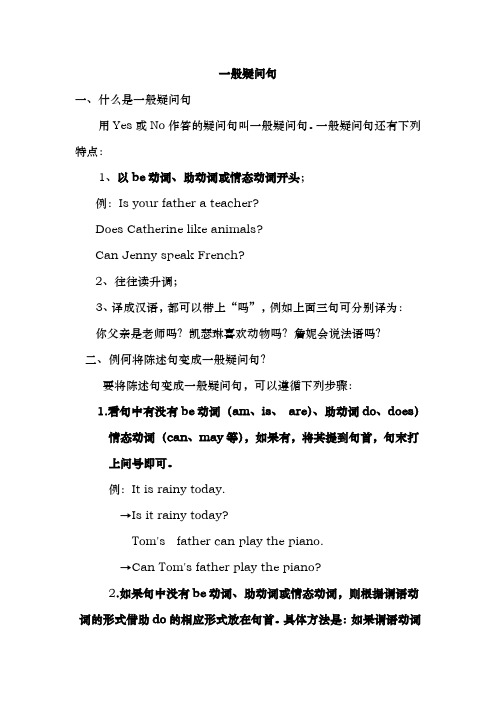
一般疑问句一、什么是一般疑问句用Yes或No作答的疑问句叫一般疑问句。
一般疑问句还有下列特点:1、以be动词、助动词或情态动词开头;例:Is your father a teacher?Does Catherine like animals?Can Jenny speak French?2、往往读升调;3、译成汉语,都可以带上“吗”,例如上面三句可分别译为:你父亲是老师吗?凯瑟琳喜欢动物吗?詹妮会说法语吗?二、例何将陈述句变成一般疑问句?要将陈述句变成一般疑问句,可以遵循下列步骤:1.看句中有没有be动词(am、is、are)、助动词do、does)情态动词(can、may等),如果有,将其提到句首,句末打上问号即可。
例:It is rainy today.→Is it rainy today?Tom's father can play the piano.→Can Tom's father play the piano?2.如果句中没有be动词、助动词或情态动词,则根据谓语动词的形式借助do的相应形式放在句首。
具体方法是:如果谓语动词是原形,则借do;如果谓语动词是一般现在时第三人称单数形式,则借does.记得助动词和情态动词后面接动词原形。
例:They go to school by bike.→Do they go to school by bike?Bill gets up at 6:30 every day.→Does bill get up at 6:30 every day?三.陈述句变一般疑问句应注意的事项陈述句变成一般疑问句除了遵循上述规则以外,还应注意下列几点:1.如果陈述句中有第一人称,则变问句时最好要变为第二人称。
例:I usually have lunch at school.→Do you usually have lunch at school?My father is playing soccer.→Is your father playing soccer?2.如果陈述句中有some, 则变问句时往往要变成any 。
小学四年级陈述句变一般疑问句(包含练习及答案)之令狐文艳创作
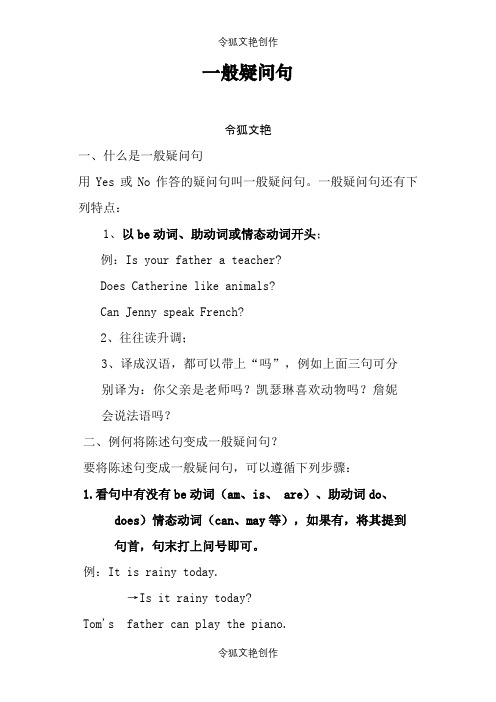
一般疑问句令狐文艳一、什么是一般疑问句用Yes或No作答的疑问句叫一般疑问句。
一般疑问句还有下列特点:1、以be动词、助动词或情态动词开头;例:Is your father a teacher?Does Catherine like animals?Can Jenny speak French?2、往往读升调;3、译成汉语,都可以带上“吗”,例如上面三句可分别译为:你父亲是老师吗?凯瑟琳喜欢动物吗?詹妮会说法语吗?二、例何将陈述句变成一般疑问句?要将陈述句变成一般疑问句,可以遵循下列步骤:1.看句中有没有be动词(am、is、 are)、助动词do、does)情态动词(can、may等),如果有,将其提到句首,句末打上问号即可。
例:It is rainy today.→Is it rainy today?Tom's father can play the piano.→Can Tom's father play the piano?2.如果句中没有be动词、助动词或情态动词,则根据谓语动词的形式借助do的相应形式放在句首。
具体方法是:如果谓语动词是原形,则借do;如果谓语动词是一般现在时第三人称单数形式,则借does.记得助动词和情态动词后面接动词原形。
例:They go to school by bike.→Do they go to school by bike?Bill gets up at 6:30 every day.→Does bill get up at 6:30 every day?三.陈述句变一般疑问句应注意的事项陈述句变成一般疑问句除了遵循上述规则以外,还应注意下列几点:1.如果陈述句中有第一人称,则变问句时最好要变为第二人称。
例:I usually have lunch at school.→Do you usually have lunch at school?My father is playing soccer.→Is your father playing soccer?2.如果陈述句中有some, 则变问句时往往要变成any 。
- 1、下载文档前请自行甄别文档内容的完整性,平台不提供额外的编辑、内容补充、找答案等附加服务。
- 2、"仅部分预览"的文档,不可在线预览部分如存在完整性等问题,可反馈申请退款(可完整预览的文档不适用该条件!)。
- 3、如文档侵犯您的权益,请联系客服反馈,我们会尽快为您处理(人工客服工作时间:9:00-18:30)。
一般疑问句一、什么是一般疑问句用Yes或No作答的疑问句叫一般疑问句。
一般疑问句还有下列特点:1、以be动词、助动词或情态动词开头;例:Is your father a teacher?Does Catherine like animals?Can Jenny speak French?2、往往读升调;3、译成汉语,都可以带上“吗”,例如上面三句可分别译为:你父亲是老师吗?凯瑟琳喜欢动物吗?詹妮会说法语吗?二、例何将陈述句变成一般疑问句?要将陈述句变成一般疑问句,可以遵循下列步骤:1.看句中有没有be动词(am、is、are)、助动词do、does)情态动词(can、may等),如果有,将其提到句首,句末打上问号即可。
例:It is rainy today.→Is it rainy today?Tom's father can play the piano.→Can Tom's father play the piano?2.如果句中没有be动词、助动词或情态动词,则根据谓语动词的形式借助do的相应形式放在句首。
具体方法是:如果谓语动词是原形,则借do;如果谓语动词是一般现在时第三人称单数形式,则借does.记得助动词和情态动词后面接动词原形。
例:They go to school by bike.→Do they go to school by bike?Bill gets up at 6:30 every day.→Does bill get up at 6:30 every day?三.陈述句变一般疑问句应注意的事项陈述句变成一般疑问句除了遵循上述规则以外,还应注意下列几点:1.如果陈述句中有第一人称,则变问句时最好要变为第二人称。
例:I usually have lunch at school.→Do you usually have lunch at school?My father is playing soccer.→Is your father playing soccer?2.如果陈述句中有some, 则变问句时往往要变成any 。
例:There is some water on the playground.→Is there any water on the playground?四.一般疑问句的回答一般疑问句往往采用简短回答,共由三部分(三个单词)组成,对这三部分(三个单词)的确定可以概括例下:1.第一个词:不是Yes就是No。
(有时根据语气的不同,Yes可由Sure, Certainly, Of course等代替.NO可由sorry 代替.)2.第二个词:问谁答谁。
即答语中的主语须与问句的主语一致(但必须用主格代词)。
例:Does she clean her room every day? Yes, she does.Is Anna′s father a doctor? No,he isn′t.Are you a student ? Yes, I am .No, I’m not如果主语是this that,回答时用it 代替,如果问句中主语these, those,回答时用they 代替。
3.第三个词:用什么问,用什么答。
即沿用问句中的引导词。
Can Jim play soccer? Yes, he can.Does Mr Bean speak English? Yes, he does.4.用No开头作否定回答时,结尾要加上not。
因为回答必须是三部分,所以否定回答必须缩写,而肯定回答不能缩写。
Is Lin Lin in Class 3? Yes, she is. / No, she isn′t.或(No, she′s not).课堂练习一、把下面的句子变为一般疑问句并做回答。
1. His father is an English teacher.2. These cats are crying.3. They can swim.4. I like to read English.5. I go to school on foot.6. He likes English.7. His father goes to work by bus.8. He is crying under the tree.9. His birthday is on the twentieth of November.10. Mrs. Li and Kitty are in a big shop.11. Kitty is wearing her new uniform.12. The boy under the tree is hungry.13. He goes to school everyday.14. I want to have a model car.15. She wants a cup of coffee.16. Mrs. Li and Kitty watch television at night.17. I do my homework after school二、用适当的词语填空1> _ __ she know all the answers ?Yes , she ____ . No, she _____.2> _____ the twins often fight ?Yes ,____ do. No, _____ don’t.3> _does____ your dad like listening to music? Yes ,____ does . No, ____ doesn’t.4>_____ uncle Tom wash his car everyday?Yes , ____ does . No, ____ doesn’t.5> _____ you have a new teacher?Yes , I ______. No, I ______.6>_____ she a teacher?Yes, she _____ . No, she _____.7> ______ you playing ball now?Yes, I ______. No, I ______.8> ______ the pig like to sleep?Yes, it ______. No, it _____.9> ______ five birds flying in the sky?Yes, they _____ .No, ____ aren’t.10> _____ your father smoking in the living room?Yes, ____ is .No, he _____.课后小测将下列句子改成一般疑问句并回答。
1. It is a lovely dog.________________________________________ 2. She is a lovely girl.________________________________________ 3. He is my father._________________________________________ 4. They are Lily’s cou sins.___________________________________5. We are classmates.______________________________________ 6. I am a doctor.________________________________________ 7. There is a bird in the tree.________________________________8. There are many stars in the sky.____________________________9. They are good friends.____________________________________ 10. I love my parents._______________________________________ 11. We have a pleasant home.__________________________________12. We like to climb the mountain.______________________________13. They go to church on Sunday.______________________________14. They walk to school every morning.__________________________15. I can swim.______________________________课堂练习答案一、1.Is his father an English teacher?Yes,he is . No, he isn’t.2.Are those cats crying?Yes,they are. No, they aren’t.3.Can they swim? Yes,they can. No. they can’t.4.Do you like to read English? Yes,I do. No,I don’t.5.Do you go to school on foot? Yes,I do. No, I don’t.6.Does he like English? Yes, he does. No, he doesn’t.7. Does his father go to work by bus?Yes, he does. No, he doesn’t.8.Is he crying under the tree? Yes,he is . No, he isn’t.9.Is his birthday on the twentieth of November?Yes,it is . No, it isn’t.10.Are Mrs. Li and Kitty in a big shop?Yes,they are. No, they aren’t.11.Is she wearing her new uniform? Yes,she is . No, she isn’t.12.Is the boy under the tree hungry? Yes,he is . No, he isn’t.13.Does he go to school everyday? Yes, he does. No, he doesn’t.14.Do you want to have a model car? Yes,I do. No,I don’t.15.Does she want a cup of coffee? Yes, he does. No, he doesn’t.17. Do you do your homework after school? Yes,I do. No,I don’t.16. Do Mrs. Li and Kitty watch television at night?Yes, they do. No, they don’t.二.1 Does does does 2.Do they they 3.Does he he4. Does he he5.Do do do6.Is is is7. Are am am8. Does does does 9.Are are they 10. Is he isn’t课后小侧答案1.Is it a lovely dog? Yes,it is . No, it isn’t.2.Is she a lovely girl ? Yes,she is . No, she isn’t.3.Is he your father? Yes,he is . No, he isn’t.4.Are they Lily’s cousins?Yes,they are. No, they aren’t.5.Are you classmates? Yes,we are. No, we aren’t.6. Are you a doctor? Yes , I am . No, I’m not.7.Is there a bird in the tree? Yes ,there is . No, there isn’t.8.Are there many stars in the sky ? Yes ,there are . No, there aren’t.9. Are they good friends? Yes,they are. No, they aren’t.10. Do you love your parents? Yes,I do. No,I don’t.11. Do you have a pleasant home? Yes,I do. No,I don’t.12. Do you like to climb the mountain? Yes,I do. No,I don’t.13. Do they go to church on Sunday?Yes,they do. No,they don’t14.Do they walk to school every morning?Yes,they do. No,they don’t.15.Can you swim? Y es,I can. No, I can’t.11。
